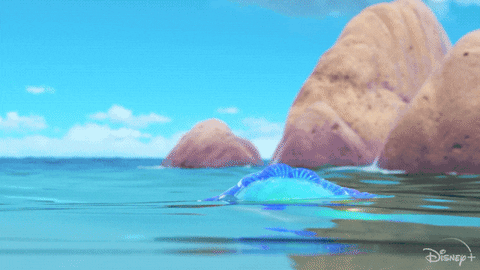I won’t lie, I was nervous when I started watching Luca. In a group watch with my friends, I saw that Luca was curious about the surface world and that Alberto collected human items, and I worried that the movie was just copying themes from The Little Mermaid (much like how The Good Dinosaur used a lot of similar themes to The Lion King). Luckily Luca becomes its own story—one that focuses on the importance and complexities of friendship above anything else, and one that has quickly become one my favorites.
Luca follows a twelve-year-old sea monster, curious about the surface world but taught to fear it by his overprotective parents. When Luca befriends Alberto, a fellow sea monster who lives on the surface, he encourages Luca to explore the surface. There he learns that when dry, sea monsters appear human, and they resume their scaly appearance when wet. But the fun doesn’t last for Luca. When his parents discover he’s been to the surface, they plan to send him to live with his uncle in the deep sea. Luca and Alberto then run away to the nearby port town of Portorosso. Their main goal is to get a vespa and go on adventures together.
What I adored about Luca was its simple message of friendship. I also enjoyed finding out that Enrico Cassarosa used his own childhood friendship, as well as Studio Ghibli films, as inspiration for the film. The two boys find a friend in each other, and Alberto helps bring sheltered Luca out of his shell by showing him the wonders of the human world he’s been taught to fear. From the knick-knacks he collects in the ocean to gelato and vespas, Alberto shares his interests with Luca and tries to get his friend to stop being afraid.
But, it’s the honest look at friendship that made Luca so special to me. From the start of Luca and Alberto’s friendship, they build their own vespa and then hide in the nearby port town of Portorosso. They have the goal of winning enough prize money to buy a vespa of their own. And then their friendship with Guilia brings conflict, because even the best and strongest of friendships have conflict.
Guilia is not an antagonistic character and doesn’t actively try to stop Luca and Alberto from being friends, but her presence ends up bringing its own trouble. Luca and Alberto befriend Guilia so the three can team up to win the Portorosso Cup and use the prize money to buy the vespa Alberto and Luca yearn for. While both boys are friends with Guilia, it’s Luca that she shares an interest with astronomy and school with. When Alberto sees the friendship between them, not having the shared interest with them makes him feels threatened. Alberto’s goal throughout the movie is to win enough money to buy a vespa and go on adventures with Luca, who he has trusted and devoted himself to after being abandoned by his father. Fearing that abandonment again, Alberto lashes out, being cruel to Luca and Guilia, and eventually reveals himself as a sea monster to Guilia. That leads to Luca’s betrayal as he lies about knowing that Alberto is a sea monster (and that he is as well).
Aside from revealing himself to be a sea monster, Alberto’s fear and anger about possibly losing Luca really resonated with me (and I’m sure resonates with a lot of people). Because who in a group of friends hasn’t felt the way Alberto has? Who hasn’t watched as two friends begin getting closer and you realize you have nothing to contribute to the conversation? Who hasn’t been pushed out because you’re no longer compatible with two friends who now are compatible? Who hasn’t lost a friend because someone better has come along? And even if not everyone has experienced it, we’ve all feared it happening. Even in the closest of friendships that fear of rejection, of losing a best friend, of not being interesting enough or worthy enough to continue being friends with, that feeling exists. I liked that Luca chose to show the ups and downs and complexities of keeping friendships.
But things work out for Alberto, Luca, and Guilia in the end. Luca and Alberto acknowledge how they hurt one another and realize that helping one another reach their goals is more important than not being friends, even if those goals have changed. By the movie’s end, Luca decides to go with Guilia to school, and Alberto finds a home in Portorosso with Guilia’s father. The three remain friends and promise to stay in contact with each other, all of them receiving their happy endings even if they weren’t the happy endings they envisioned at the start.
I also found Luca to be nostalgic in some ways. With everything that’s happened in the past year, my main contact with friends has been virtual. While it’s awesome that we can contact each other digitally during a pandemic (including watching Luca), I’ve missed seeing my friends in person, missed the little adventures we would go on and just getting to hang out and laugh with them, for things to return to normal again. And while the world slowly inches its way to normalcy, or whatever normal will be once the pandemic ends, I’m excited that the chance to see my friends again safely is coming.
Luca is a movie about friendship, and that’s a surprisingly rare theme to find in movies. Even in movies aimed for children, it’s hard to find one that shows the importance of platonic relationships because so much of our media focuses on a happily ever after, which generally comes from a romantic relationship. Luca proves that happy endings can be found through our friends, through our goals and dreams that our friends encourage us to take, and our friends who even far away are always on the sidelines cheering us on.


Comments are closed.